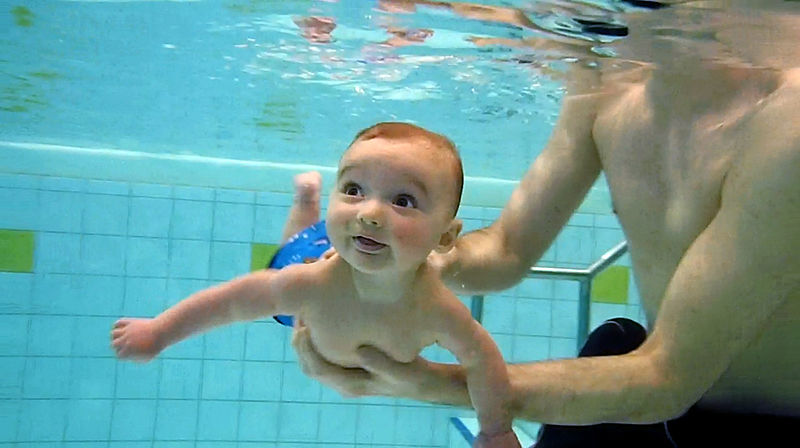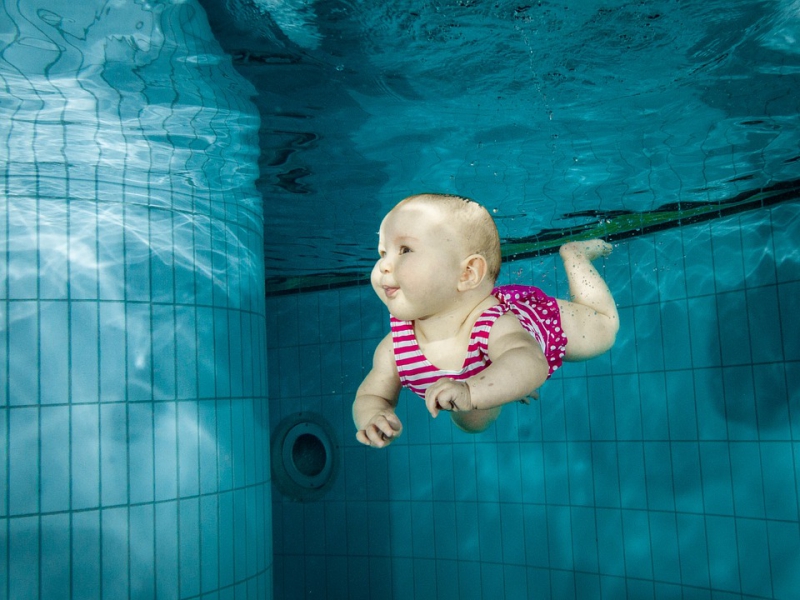 |
| Swimming, which is learned from childhood, has a great effect in the long term (Photo = ⓒ Wikimedia Commons) |
You should be able to be as active and excited as possible to be exposed to colorful experiences. At this time, toys that stimulate the senses and play that helps learning development are important. However, if you enter the walking stage afterwards, it is better to pursue a more positive effect by combining appropriate activities. One of them is swimming, and swimming can be beneficial for a lifetime if learned from a young age. The benefit of swimming with the baby is revealed.
Strengthening parent-child bond
Swimming makes a great contribution to strengthening the bond between parents and baby. When parents swim alongside the baby in the pool together, the physical contact becomes natural and the sticky relationship is formed. Each moment of this physical contact leads to strengthening of the bond, making the baby think of the parent as more comfortable and comforting.
Facilitate natural reflection
The baby actually gets a natural reflex reaction as soon as she is born. For example, it is a kicking action. But in about six months, these reflexes will soon disappear, and swimming can be a great help in naturally developing this ability. Since the swimming itself must float on the surface of the water, the kicking reflex can be improved even more during swimming. Allow the baby to float on the water or continue to reflex to kick back to the parent.
Positive for physical health
Swimming is also one of the most gentle movements that will benefit the baby's body. Because it develops and strengthens the baby's lungs, muscles, heart, and other important organs, the lungs are exposed to aquatic exercise and can maintain proper breathing and longer stamina. It also helps with the ability to grab or hold something, and is also effective in promoting the digestive system. In addition, swimming can burn up to 300 calories, helping the baby maintain a healthy weight without being overweight or obese.
Prevent drowning and other accidents
In the summer it is lively with drowning in the beach or pool. However, if you learn to swim properly from your childhood, you can escape from these worries. There is less need for parents to watch carefully from side to side. Because the baby has already learned the skill of floating on the water. Parents just have to let the baby swim where the water is not fast and deep. Even if the baby is somewhat accustomed to swimming, he is still unable to lift his body because he is not a perfect adult. This can lead to drowning, so it is good to watch your parents carefully from the side.
 |
| ▲ Baby-learning swim helps improve parental ties and improve physical and mental health (Photo: ⓒ Pixar Bay) |
Promoting mental health
In addition to physical health, swimming also helps mental health. It is effective for cognitive ability and mental development, and it affects the improvement of understanding and mental power as the baby becomes accustomed to instruction of swimming instructor or parent. In fact, according to a study conducted in Germany, children who learned to swim at an early age showed more advanced social skills, athletic development, and a higher level of intelligence than their peers.
It is also observed that children who learn to swim early in the day are about 6 to 15 months ahead of their peers. Especially, at the beginning of school life, it showed excellent ability in language, calculation, instruction, basic mathematics, and so on.
Improvement of physical adjustment ability
Swimming stimulates the five senses and adjusts the physical and mental skills of the baby. This means that the touch, vision, hearing, and sense of smell and taste that babies touch while swimming can improve brain activity and response. It also contributes to the improvement of balance and athletic performance. In a study conducted by the Norwegian University of Science and Technology in 2009, it was found that babies who are accustomed to swimming are well balanced and can catch things easily.
Improve your confidence
Some children may not want to go to the pool because they are afraid of water. I am not accustomed to going into the water yet because I do not know how to move. Fear and worry can precede this. However, after a few moments from the start, the previous fears have already disappeared and you may find yourself enjoying the swim better. This is because self-confidence has improved as the fear overcome during swimming.
![[Parenting] Swimming, why should you learn from your childhood? parenting swimming why should you learn from your childhood 1](https://moontore.com/wp-content/uploads/2019/02/parenting-swimming-why-should-you-learn-from-your-childhood-1-1200x700.jpg)


